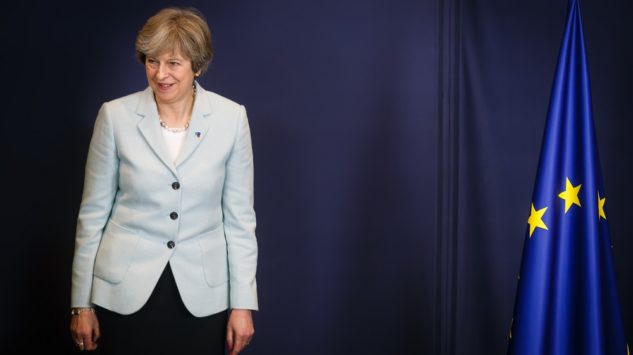Issue Briefs

No More Special Relationship
Michael Binyon
May 2, 2018
It was always assumed that Britain, enjoying a “special relationship” with the United States, would be the first foreign focus of any new American president. No longer. Donald Trump made his first presidential visit overseas to Saudi Arabia. And Emmanuel Macron, feted across Washington after a triumphal state visit, is now seen in the White House as Trump’s best friend and the European leader with whom he can do business.
Building on his success, President Macron has now set off for Australia, underlining Britain’s humiliation by asserting his global role in an Anglophone country long seen as one of Britain’s closest Commonwealth allies.
UK Government shaken by crises
Theresa May, meanwhile, remains at home as yet another crisis shakes her government. She suffered another political setback when it was revealed that the government has been deporting black people from the Caribbean who had lived all their lives in Britain but who did not have papers to prove when they arrived as children of immigrants in the 1950s.
The scandal grew when it was revealed that elderly people in their 60s and 70s had been forced to go to Jamaica or other Caribbean islands where they knew no one and had no roots. As a result of the uproar, Amber Rudd, the Home Secretary (Minister of the Interior) was forced to resign, and the government announced it would change its policy of deliberately creating a “hostile environment” for immigration.
A stain on Theresa May
This new crisis is damaging to May for several reasons. First, it suggests that the Conservative government had a clearly racist policy towards black Britons, despite its public insistence on racial equality. Secondly, May herself was Home Secretary before becoming Prime Minister, and was largely responsible for the attempt to deport black Caribbean Britons and for trying to force other immigrants to leave. And thirdly, Amber Rudd was a woman whom May was hoping to promote to show that women had equal opportunities in politics.
Brexit still uncertain
The scandal has erupted at a time when Britain is struggling to keep the Brexit negotiations on track. Some progress has been made, but several of the vital key issues remain unresolved. There is now less than a year before Britain is due to leave the European Union, and without a deal there could be a disastrous collapse of all talks and an undignified British departure that would cost the economy millions of pounds in lost exports. The difficulties were underlined this week when Michel Barnier, the chief EU negotiator, made a visit to Ireland to see whether it would be possible for Britain to leave the EU customs union without imposing full border controls between Northern Ireland and the Republic of Ireland. The EU has said a border-free crossing is essential, but is impossible without common tariff barriers for both Britain and the EU.
Soft or hard Brexit?
The negotiations are all the more difficult for May because her cabinet is still deeply divided on Brexit. Boris Johnson, the foreign secretary, and several other hardline pro-Brexit ministers insist that Britain must leave the EU customs union; others are hoping to keep Britain still in the free trade zone with Europe. The government has been defeated again in the House of Lords, which voted to block any departure from the customs union, and a big vote on this issue is coming up in the House of Commons, which the government is also likely to lose.
Weak Prime Minister at home and abroad
All this means that May is seen at home as a weak and ineffective prime minister. She is unable to push through much legislation, as the ruling Conservative party has no overall majority in parliament. And because of her weak position at home, she is not regarded as an influential politician overseas. As a result, Britain counts for little in areas where it has traditionally played a big role and where historical links used to be strong.
For instance, in the Middle East, Britain has offered no new initiatives and has not used any influence behind the scenes to resolve difficulties such as the civil war in Yemen, the Israeli-Palestinian question or the arguments over the Iran nuclear deal. Likewise, in India, Britain’s hopes of rapidly expanding trade and political links have met with a cool response. And in the United Nations Security Council, Britain is now seen as the weakest of the five permanent members.
Bad chemistry with Washington
The most galling and visible result has been the lack of interest in Washington in British affairs. May was one of Trump’s first visitors, but the two of them were mocked for holding hands in public and the personal chemistry did not seem to work well. May was embarrassed that Trump seemed in no hurry to accept an early invitation to make a state visit to Britain. He has already postponed another visit that was planned for the spring. He has been irritated by May’s criticisms of some of his tweets and has been angered by hostile remarks from the mayor of London and by the large number of people who signed a petition that the invitation for a state visit should be withdrawn. The visit has been rescheduled for July, but little is now expected of it, and Trump may expect a cool welcome from the British public.
Frozen ties with Moscow
Relations between Britain and Russia are far worse, following the attempted assassination of Sergei Skripal, a former Russian spy, and his daughter Yulia in the English town of Salisbury. The Russians mocked Britain’s accusations that Moscow ordered the poisoning of Skripal with a nerve agent made only in Russia, and tried to isolate Britain from its allies.
May was encouraged that more than 20 allied countries supported her when she expelled 23 Russian diplomats by also expelling Russians from embassies across Europe and America. But the breakdown in relations with Russia has also posed a big question about whether there should be tighter controls on the large number of Russian oligarchs living in Britain. They have brought in a lot of money, but May’s government is now accused of allowing them to launder dirty money in London without asking questions about where that money came from.
Good-bye Europe
Of course Britain’s biggest loss of influence has been within Europe. Britain is still technically part of the EU, but ministers now attend few of the regular EU council meetings, and their views are not taken seriously. The country’s limbo status now means that Britain’s voice counts for little in European discussions of common foreign policy or of the EU’s own development. And with Angela Merkel heading a shaky coalition government and clearly having lost prestige at home, President Macron has stepped into the leadership vacuum and is demonstrating a global activism – politically, militarily and in public relations – that used to be associated more with British policy. He clearly hopes that business and banking companies will move their headquarters from London to Paris and that overseas investment from countries such as Japan with now go to France rather than to Britain.
Loss of influence goes unnoticed
Britons have barely noticed their loss of influence overseas, as they are preoccupied with the Brexit issue, the slow economic growth and the apparent political paralysis within the government. But to many, the country already seems very different from the Britain of Margaret Thatcher 30 years ago, when ministers used to boast that, like a good boxer, Britain “punched above its weight”. Like a poor boxer, Britain now seems knocked-out and on the floor.
 |
Michael Binyon is a GPI Senior Adviser. He has been an editorial writer, columnist and foreign correspondent for The Times (of London) since 1971. For 15 years he was based overseas, reporting from Moscow, Washington, Bonn and Brussels, before returning to London to be diplomatic editor in 1991 and becoming the main foreign editorial writer in 2000. He retired from the staff in 2009 but still writes for The Times and other publications, and is a frequent broadcaster for the BBC and French, German, Canadian, Russian and Middle Eastern radio and television.
He published “Life in Russia” in 1983, has won two British journalism prizes and was awarded the OBE by the Queen in 2000.
|